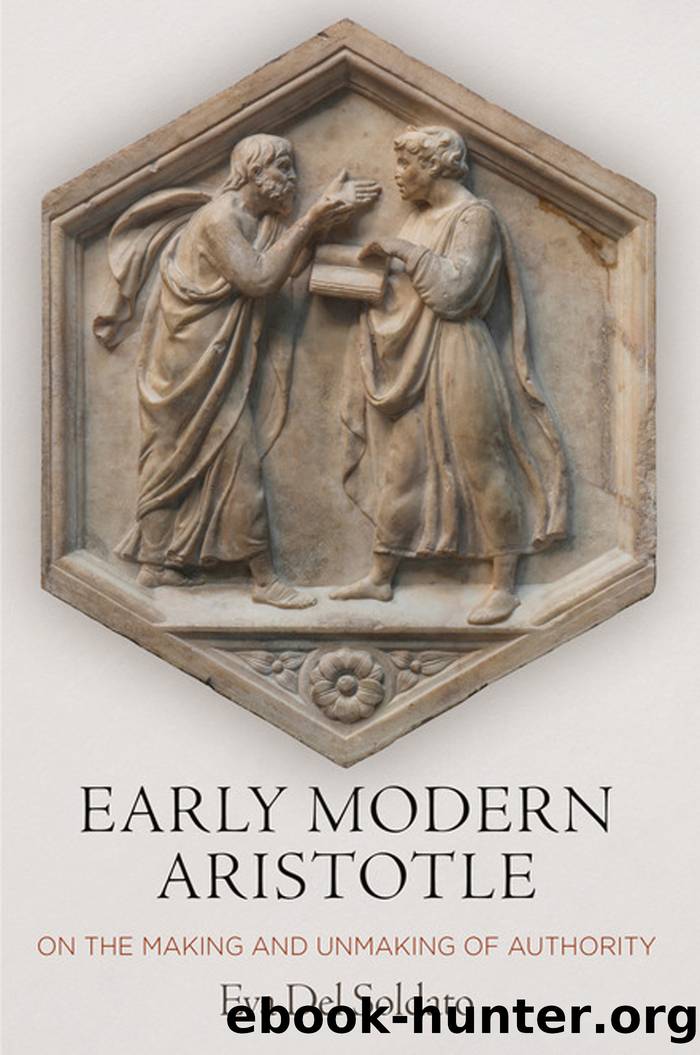Early Modern Aristotle by Soldato Eva Del;

Author:Soldato, Eva Del;
Language: eng
Format: epub
Publisher: University of Pennsylvania Press
Published: 2020-03-15T00:00:00+00:00
Bringing Down the Curtain
The decline of Aristotelianism in the seventeenth century caused the âif Aristotle were aliveâ motif to lose its force, and in the eighteenth century it no longer turned up in scientific and religious texts. The reborn Aristotle nevertheless continued to appear in works belonging to a different genre: literary theoryâmore specifically, theater. The motif arrived relatively late in this context: after all, it was not until the second half of the sixteenth century that Aristotleâs Poetics significantly began to influence the composition and criticism of literary works around Europe, in a climate that favored the search for norms and rules, such as that which followed the Council of Trent. The recovery of the Poetics and its later fortuna was, however, anything but faithful to the original treatise. The emphasis placed on the so-called three unities (of time, space, and action), which many commentators considered essential for the composition of tragedy, is one example.119 This rule was purportedly derived from the Poetics yet appears nowhere in the text, which says little about unity of action, barely hints at unity of time, and never mentions unity of place. By forcibly underscoring the prescriptive character of the treatise by means of rules like this one, the revival of the Poetics caused Aristotle to be perceived as a tyrannical authority by those who preferred a less normative approach to literature. This polemical reaction and subsequent debates were instrumental in triggering a surge in the use of the âif Aristotle were aliveâ motif in literary contexts. The reborn Philosopher was called on to reject the modern abuse of his Poetics and to denounce its inappropriate transformation into a set of inflexible prescriptions.
A Jesuit dramatist offers an interesting example of how the subject of a play could affect the application of the Aristotelian rules and, consequently, the reaction to them. In 1622 Vincenzo Guiniggi (1588â1653) staged his drama Ignatius in Monte Serrato arma mutans at the Collegio Romano, the Jesuit orderâs most prestigious institute of higher learning. Here dramatic productions were common, since the Jesuit curriculum favored the use of theater for didactic purposes.120 When he published the play fifteen years later, Guiniggi added a preface in which he explained why he had decided to deviate partially from the Aristotelian rules for the composition of the Ignatius. The reasons were of a historical nature: Guiniggi stated, first of all, that it was hard to understand what Aristotle really thought, and that at times those eager to defend him end up in conflict with him. But most of all, Guiniggi invited his readers to consider the inadequacy of the Aristotelian prescriptions in the age of Christianity. The Poetics had worked well in the dark days of paganism,
but if since that time God has clothed himself in humanity, and human nature has put on divinity, why should human action, which poetry imitates, not put on something above and beyond the human, and above the laws and opinions of Aristotle? ⦠Had Aristotle known the state
Download
This site does not store any files on its server. We only index and link to content provided by other sites. Please contact the content providers to delete copyright contents if any and email us, we'll remove relevant links or contents immediately.
The remains of the day by Kazuo Ishiguro(8965)
Tools of Titans by Timothy Ferriss(8360)
Giovanni's Room by James Baldwin(7315)
The Black Swan by Nassim Nicholas Taleb(7097)
Inner Engineering: A Yogi's Guide to Joy by Sadhguru(6783)
The Way of Zen by Alan W. Watts(6590)
Asking the Right Questions: A Guide to Critical Thinking by M. Neil Browne & Stuart M. Keeley(5751)
The Power of Now: A Guide to Spiritual Enlightenment by Eckhart Tolle(5742)
The Six Wives Of Henry VIII (WOMEN IN HISTORY) by Fraser Antonia(5493)
Astrophysics for People in a Hurry by Neil DeGrasse Tyson(5172)
Housekeeping by Marilynne Robinson(4433)
12 Rules for Life by Jordan B. Peterson(4298)
Double Down (Diary of a Wimpy Kid Book 11) by Jeff Kinney(4257)
The Ethical Slut by Janet W. Hardy(4236)
Skin in the Game by Nassim Nicholas Taleb(4232)
Ikigai by Héctor García & Francesc Miralles(4229)
The Art of Happiness by The Dalai Lama(4120)
Skin in the Game: Hidden Asymmetries in Daily Life by Nassim Nicholas Taleb(3986)
Walking by Henry David Thoreau(3949)
